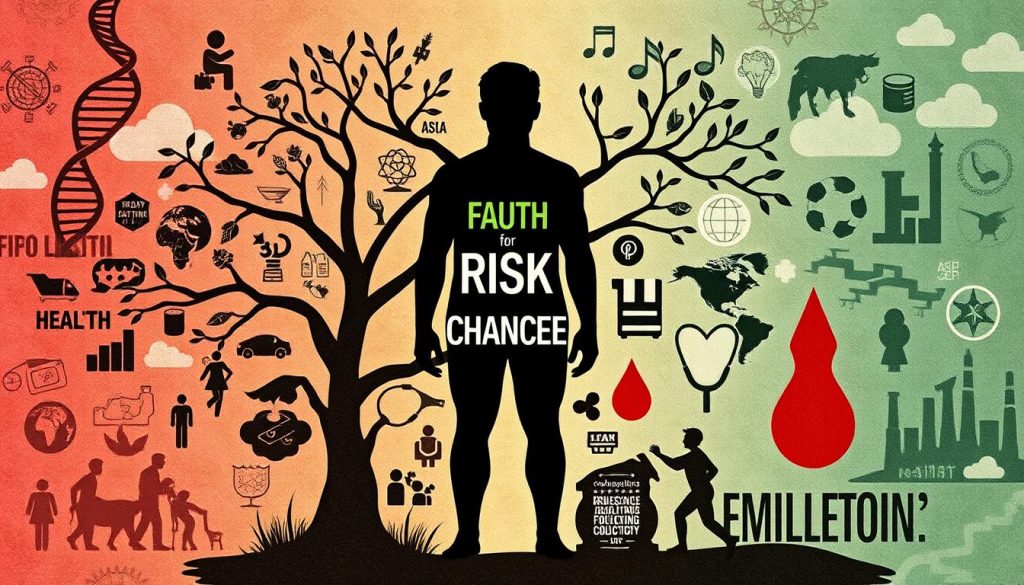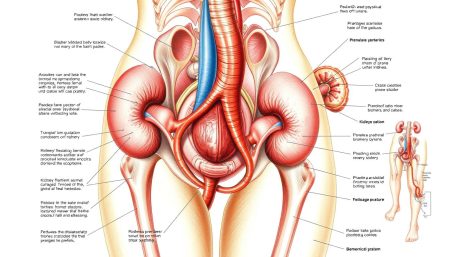Prostate cancer is a big worry for men all over the world. Knowing what causes it and its risk factors is key to stopping it early. As men get older, their risk of getting this disease goes up. It’s important to know what factors lead to it.
Even though we don’t know all the causes of prostate cancer, scientists have found some risk factors. These include genes, lifestyle, and the environment. Learning about these can help us understand how to prevent it.
We will look into what makes a man more likely to get prostate cancer. This includes changes in cells and lifestyle choices. Knowing this can help men take better care of their health.
Understanding the Basics of Prostate Cancer Development
Prostate cancer starts when cells in the prostate gland grow too much. This growth is due to changes at the cellular level. Let’s look at what causes prostate cancer to form.
Cell Mutation and DNA Damage in Prostate Tissue
Cancer starts with DNA changes in cells. These changes can come from aging, toxins, or genes passed down. As these cells grow, they form tumors that can cause symptoms.
Role of Hormones in Cancer Growth
Hormones are key in prostate cancer growth. Testosterone and its product, dihydrotestosterone, help cancer cells grow. This is why some treatments lower testosterone levels.
Normal Prostate Function vs. Cancerous Changes
The prostate gland makes a protein called prostate-specific antigen (PSA). In cancer, PSA levels go up. This is why PSA tests are used for screening. Here’s how normal and cancerous prostates differ:
| Feature | Normal Prostate | Cancerous Prostate |
|---|---|---|
| Cell growth | Controlled | Uncontrolled |
| PSA levels | Usually low | Often elevated |
| Hormone response | Balanced | Overstimulated |
| Tissue structure | Organized | Disorganized |
Knowing these basics helps spot prostate cancer symptoms early. It also helps understand PSA test results. Early detection is key for effective treatment.
What Causes a Prostate Cancer and Primary Risk Factors
Knowing about prostate cancer risk factors is key to catching it early. Age is a big factor. Men over 50 are more likely to get prostate cancer, and the risk goes up with age.
Race and ethnicity also play a part. African American men are more likely to get advanced prostate cancer. The exact reasons are still being studied, but it might be due to genetics and environment.

Family history is another important factor. If your relatives have had prostate cancer, you’re at higher risk. This shows why regular check-ups are crucial for those with a family history.
What you eat can also affect your prostate health. Eating a lot of red meat and saturated fats might raise your risk. But, eating more fruits, veggies, and whole grains could help protect you.
| Risk Factor | Impact on Prostate Cancer Risk |
|---|---|
| Age (over 50) | Significantly increases risk |
| African American ethnicity | Higher risk of advanced prostate cancer |
| Family history | Increases risk, especially with first-degree relatives |
| High-fat diet | May increase risk |
| Obesity | Associated with higher risk of aggressive prostate cancer |
While some risks like age and genetics can’t be changed, others can. Staying healthy, exercising, and eating well might lower your risk. Regular health checks and screenings are vital, especially if you have several risk factors.
Genetic and Family-Related Risk Factors
Knowing your genetic background is key to understanding your prostate cancer risk. Family history and inherited gene mutations can greatly affect your risk.
Inherited Gene Mutations and Their Impact
Some gene mutations passed down in families can raise your risk of prostate cancer. The BRCA1 and BRCA2 genes, linked to breast cancer, also play a role. Men with these mutations might need earlier or more frequent screenings.
Family History Patterns and Risk Assessment
Your family’s health history can show your prostate cancer risk. Men with a father or brother with prostate cancer face a higher risk. This risk grows if many close relatives had it, especially young.
Genetic Testing for Prostate Cancer Risk
Genetic tests can uncover inherited mutations that raise your risk. This info lets doctors create a personalized screening plan. They might suggest starting screenings earlier or using more precise tests like the digital rectal exam.
“Knowing your genetic risk for prostate cancer empowers you to take proactive steps in your health journey.”
If prostate cancer runs in your family, discuss your risk with your doctor. They can help decide when and how to screen you. They’ll choose the best methods, like the digital rectal exam, for you.
Lifestyle and Environmental Risk Factors
Your daily habits and surroundings greatly impact prostate health. Let’s look at how diet, exercise, and the environment can affect your risk of prostate cancer.
Dietary Influences on Prostate Health
What you eat is important. Eating lots of fruits, vegetables, and whole grains might lower your risk. On the other hand, eating too much red meat and high-fat dairy could raise it. Tomatoes, full of lycopene, might help protect you.

Physical Activity and Body Weight Impact
Being active is crucial. Regular exercise helps keep you at a healthy weight and might lower your risk. Being overweight is linked to more serious forms of the disease. Try to do at least 30 minutes of moderate exercise every day.
Chemical Exposure and Environmental Toxins
Our environment also affects prostate health. Exposure to chemicals like pesticides or industrial pollutants might increase your risk. Jobs like farming or painting might expose you to more of these chemicals.
| Risk Factor | Impact on Prostate Cancer Risk |
|---|---|
| High-fat diet | May increase risk |
| Regular exercise | May decrease risk |
| Obesity | Linked to more aggressive forms |
| Chemical exposure | Potential risk increase |
While making lifestyle changes can help, they’re not a full replacement for medical care. If you’re worried about prostate cancer, talk to your doctor. They can discuss treatment options, like hormone therapy. Early detection and proper treatment are key for the best results.
Early Detection and Prevention Strategies
Catching prostate cancer early is crucial for better treatment outcomes. Regular screening is important for men as they get older. The main screening tools are the prostate-specific antigen (PSA) blood test and the digital rectal exam (DRE).
Doctors usually suggest yearly screenings for men starting at 50. Those at higher risk might start earlier. It’s important to talk to your doctor about your risk and screening plan.
If screenings show concerns, a prostate biopsy might be suggested. Biopsies can be uncomfortable but are key for diagnosis. New methods like MRI-guided biopsies are more accurate and less painful.
Changing your lifestyle can also help prevent prostate cancer:
- Eat more fruits, vegetables, and whole grains
- Stay active
- Keep a healthy weight
- Stop smoking
- Drink less alcohol
Some research suggests that staying healthy overall might lower cancer risk. While not proven, these habits are good for your health anyway.
“Early detection through regular screening gives us the best chance to treat prostate cancer successfully. Don’t wait for symptoms – talk to your doctor about when to start screening.”
| Screening Method | Frequency | Starting Age |
|---|---|---|
| PSA Test | Yearly | 50 (earlier for high-risk men) |
| Digital Rectal Exam | Yearly | 50 (earlier for high-risk men) |
| Prostate Biopsy | As needed based on screening results | Any age if indicated |
Living with Prostate Cancer: Coping and Support
Getting a prostate cancer diagnosis can feel overwhelming. Men deal with physical and emotional challenges as they look into prostate cancer treatment and lifestyle changes. Building a strong support network and finding effective coping strategies is key.
Many men find comfort in joining support groups or talking with others who have gone through similar experiences. These connections offer valuable insights and emotional support. Also, seeking help from mental health professionals can help manage anxiety and depression that come with a cancer diagnosis.
For those with advanced prostate cancer, keeping quality of life in check is crucial. Palliative care teams can help manage symptoms and improve well-being. It’s important to discuss all options with your healthcare team to create a treatment plan that fits your goals and values.
Remember, every man’s journey with prostate cancer is unique. Stay informed about your condition, talk openly with loved ones, and don’t hesitate to ask for help. With the right support and resources, many men find ways to live fulfilling lives while managing their prostate cancer.
FAQ
Q: What are the main risk factors for prostate cancer?
A: Main risk factors for prostate cancer include age and race. African American men are at higher risk. Family history and genetic mutations also play a role. Lifestyle factors like diet and physical activity are important too.
Q: How does prostate cancer develop?
A: Prostate cancer starts with DNA damage in prostate cells. Hormones, especially testosterone, help these cells grow. It often begins with small changes in the prostate tissue.
Q: What are the early symptoms of prostate cancer?
A: Early prostate cancer often has no symptoms. As it grows, symptoms like frequent urination and weak urine flow may appear. Blood in urine or semen and pelvic discomfort are also signs. But, these can also be from non-cancerous conditions, so seeing a doctor is key.
Q: How is prostate cancer screened?
A: Screening for prostate cancer includes the PSA blood test and the digital rectal exam (DRE). If these tests show a possible cancer, a prostate biopsy might be needed.
Q: Can prostate cancer be prevented?
A: Preventing prostate cancer is not guaranteed, but lifestyle choices can help. Eating a healthy diet, exercising, and avoiding smoking are good. Regular check-ups and screenings are also important for early detection.
Q: What are the treatment options for prostate cancer?
A: Treatment options depend on the cancer’s stage and aggressiveness. They also consider the patient’s health and preferences. Options include active surveillance, surgery, radiation, hormone therapy, and chemotherapy. New treatments like targeted therapies and immunotherapies are also available.
Q: How does genetic testing help in assessing prostate cancer risk?
A: Genetic testing can find inherited mutations linked to prostate cancer risk. This helps guide screening and prevention, especially for those with a family history of cancer.
Q: What support resources are available for those living with prostate cancer?
A: Many support resources are available, including support groups and counseling services. Organizations like the Prostate Cancer Foundation and the American Cancer Society offer help. Building a strong support network and talking openly with healthcare teams is crucial.


















